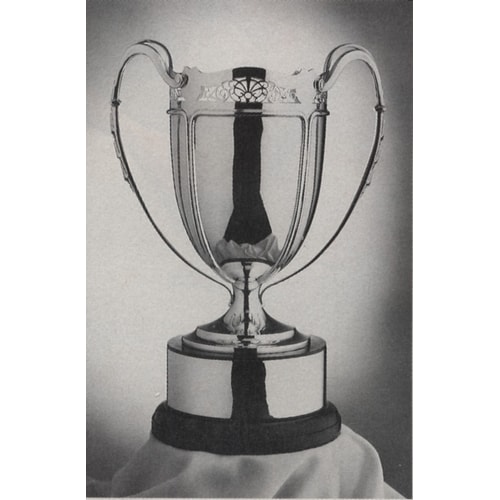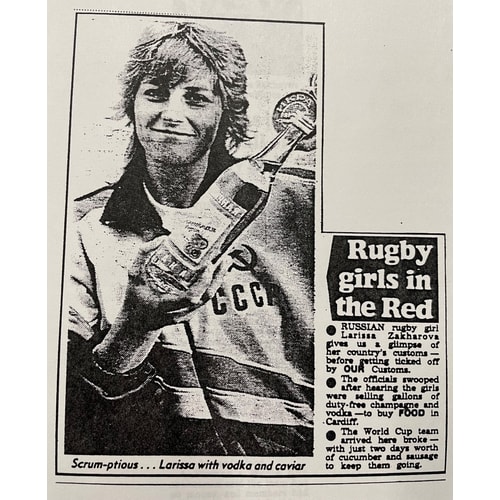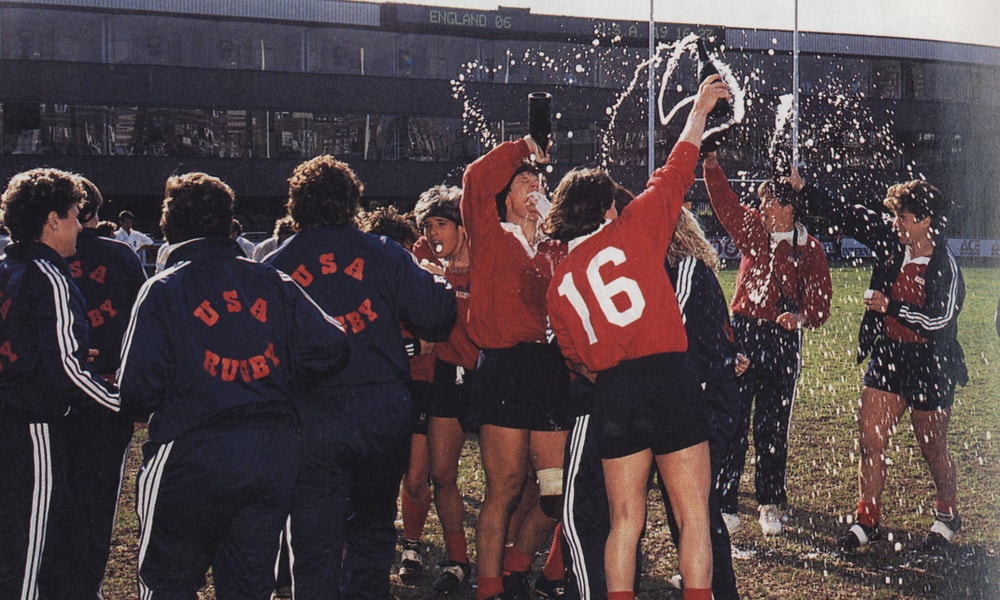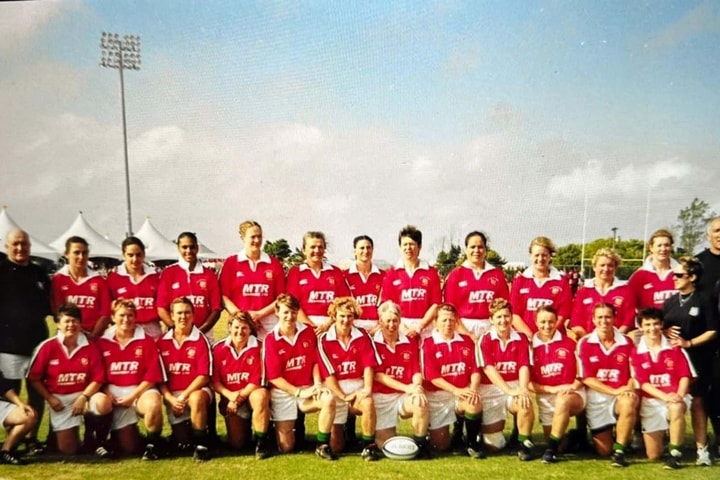
From The Vaults
The Inaugural Tournament
The inaugural Women's Rugby World Cup in 1991 was a not only a breakthrough moment in the development of women's rugby, but in women's sport in general. It was also a display of creativity, vision and sheer bloody-mindedness in equal measure. Taking place over just nine days, twelve nations played fifteen matches, culminating in the USA Women's Eagles defeating England's Red Roses in front of 3000 people at Cardiff Arms Park.
Here was the humble origins of a tournament that has proven to be the catalyst for the development of women's rugby and has steadily become one of the most celebrated competitions on the global sports calendar.

At the time, however, newspapers around the globe were not full of match reports or interviews with the newly crowned world champions. Instead, they focused almost exclusively on a side that lost both of their group games and exited the tournament without scoring a single point. An unheralded side from a minor rugby playing nation, that would cease even to exist shortly after the tournament ended.
Aiming high, the tournament organisers had targeted sponsorship and broadcasting revenue to supplement ticket sales in the hope that this would fund the competition. Despite their best efforts no sponsors were found and, reluctantly, they had to inform the participating nations that they would need to pay for their own travel, food and accommodation in order to participate. Despite this, all twelve teams wrote back to say that they would still be coming.
One team, however, had privately determined an unorthodox plan for self-sufficiency. The Soviet Union was already in the process of dissolution by April 1991. By the end of the year, it would have abandoned communism entirely and disbanded into Russia and other sovereign nations, such as Belarus, Ukraine, Estonia, Latvia and Lithuania.
The Soviet Union Rugby Football Union had agreed to fund their team's travel but financial assistance would end at the airport. Thereafter, the players would be employing Western means to fulfil the rest of their trip. To this end, they arrived in the UK with several crates full of cheap vodka, Russian champagne, Russian dolls, caviar, pennants and other assorted souvenirs that they intended to sell.
Having no money on arrival, the team were unable to leave the airport and so former England captain Carol Isherwood and Helen Ames had to drive all the way from Cardiff to Heathrow to pick them up in a minibus.
On arrival in Wales, the team were put up in the South Glamorgan Teacher Training Institute. They had brought enough cheese, sausage, cucumbers and black bread to feed themselves for two days but when that ran out they began scavenging leftovers from the breakfast trolley. It was at this point that the tournament organisers realised that they might have a problem.
'Booze is one of the few things still plentiful and cheap in Russia…we don't have the money to eat so we brought vodka and sports clothes to swap for food.' - Mr Vladimir Kobsev (USSR Team Coach), Daily Telegraph
Team Coach Vladimir Kobsev had initially been hopeful that their plan would work but things had become more complicated when half of their vodka was stolen at Moscow Airport. Unfortunately for Koblev, their goods and alcohol didn't sell particularly well and to make matters worse, they attracted the attention of UK Customs & Excise.
Newspaper Coverage
When confronted, they flatly denied any improper trading activities but their case was weakened by pictures of Team captain Irina Korsakova in the Western Mail and Second Row Larissa Zakharova in The Sun holding up bottles of vodka and caviar.
Kobsev's defence, as reported in the Telegraph, was that the supplies had been brought to give to 'friends' as souvenirs. Speaking no-Russian, UK Customs & Excise Officer Keith Good found the interrogation challenging and other newspapers reported that the language barrier was too great an obstacle. After emerging from the interview Good confirmed that 'It is against the law to sell duty-free goods' but concluded that 'It would appear they have only brought in the legal amount'.

Everyone breathed a sigh of relief, but whilst the Russian team had avoided prosecution, they were no nearer a solution to their problem. They had no food, no money and no means of paying for their accommodation. By now, however, their predicament was being reported in newspapers in the UK and North America and so the people of Cardiff decided to take matters in hand.
An anonymous former Wales men's player contributed £1200 off the bat, followed by a £100 donation from the mother of the Welsh hooker. Local cafes offered free meals, a shop offered 20 minutes free shopping and Cardiff Marketing Board donated £1500 in clothing vouchers. Slightly further afield, Keith Prowse Hospitality offered to pay for the majority of the team's accommodation with Marketing Director Wayne George quoted in the newspapers as saying, 'International fellowship knows no boundaries'.
Kobsev was deeply moved by this spirit of generosity, 'The Welsh are wonderful, one minute we have nothing and now this. We did not know there was so much kindness in Welsh Rugby' he said.
Despite this, the tournament organisers remained in the red as the final games of the tournament approached and Press Officer Alice Cooper jokingly suggested to television reporters that she was considering remortgaging her house. A further advance came from the Sports Council for Wales, leaving a final deficit of £6756.

Tournament Winners - USA
Despite the effectiveness of the Red Roses' set piece, the greater athleticism of the USA proved the decisive factor in the final and they became the first to lift the trophy. All attested to the quality of the play and a platform for the future was laid. But the tournament organisers were left to foot the bill.
As the players returned home, reports began to circulate that a 'group of businessmen who insist upon remaining anonymous' had come forward and agreed to write off the losses. Years later it was revealed that the secretive businessmen were in fact, the Rugby Football Union (RFU).
With the RFU playing the role of Deus ex machina, the 1991 Women's Rugby World Cup entered the record books and a second competition followed in 1994 featuring twelve teams, including Russia. In another landmark for the sport's development, the third tournament was delivered under the official auspices of the International Rugby Board (IRB now World Rugby).
A template was created in 1991 that has continued to this day. Realising the dream of those early administrators, the 2025 final will be played in front of a capacity crowd at Allianz Stadium, Twickenham. Deborah Griffin, whose idea it was in the first place, will be sat in the Royal Box as the first female President of the Rugby Football Union in 154 years.
The Women's Eagles victory in 1991 may still be USA Rugby's greatest achievement but it was the team from the Soviet Union that made all of the headlines and ensured that the tournament achieved wider recognition.




